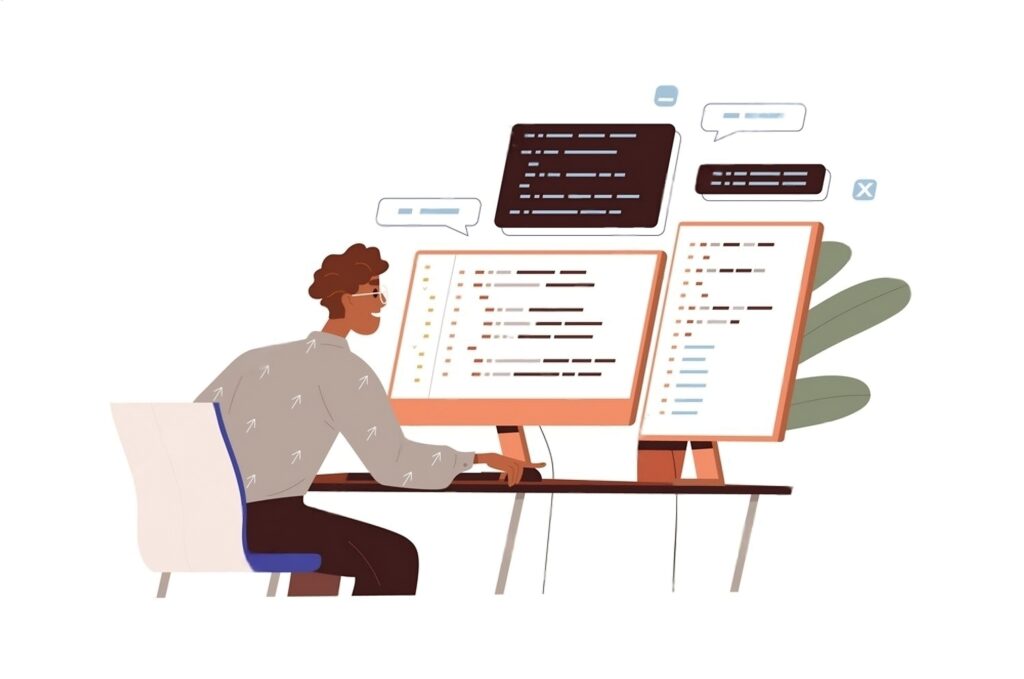
As a developer, choosing the right programming language can make or break your project.
With so many languages available, Python and Scala stand out as two powerful choices in 2025.
Both have unique strengths, and each excels in different areas of software development.
But how do you decide which one is right for you?
In this article, we’ll dive deep into the differences between Python vs Scala and help you understand their strengths, weaknesses, and the best use cases for each. By the end, you’ll know which language to pick for your next project.
Table of Contents
ToggleWhat is Python and Why Is It Popular?
Python is a high-level, interpreted programming language that’s easy to learn and widely used for everything from web development to data science.
Its key features include:
- Readable syntax: Python is known for its simplicity. It’s often called a “beginner-friendly” language because its syntax mimics natural language.
- Extensive libraries: Whether you’re working with machine learning, web development, or data analysis, Python has a rich set of libraries to help you get started.
- Community support: Python boasts one of the largest programming communities, meaning plenty of resources, tutorials, and third-party tools are available.
Python’s versatility has made it the go-to language for everything from web apps to artificial intelligence, and it continues to rise in popularity.
What is Scala and How Does It Compare?
Scala is a hybrid functional and object-oriented language that runs on the JVM (Java Virtual Machine). It’s known for its concise syntax and ability to integrate seamlessly with Java.
Key features of Scala:
- Concise code: Scala allows for expressive, less verbose code compared to Java, which can speed up development and reduce bugs.
- Functional programming: Unlike Python, which is primarily object-oriented, Scala embraces functional programming, making it ideal for complex applications and big data processing.
- Seamless Java integration: Scala can use Java libraries, making it a great choice for developers already familiar with Java.
While Scala has a steeper learning curve than Python, it’s a powerful tool for large-scale systems and big data projects, especially in environments that use Apache Spark.
Python vs Scala: Key Differences to Know
Here’s a quick rundown of the main differences between Python vs Scala:
- Syntax:
- Python: Simple, readable, and user-friendly. It’s designed to be intuitive and accessible for beginners.
- Scala: More complex and compact, but offers more power and flexibility for experienced developers, especially those with a background in functional programming.
- Paradigm:
- Python: Primarily object-oriented but also supports functional programming.
- Scala: A hybrid language that combines both object-oriented and functional programming paradigms.
- Performance:
- Python: Generally slower than Scala due to being an interpreted language.
- Scala: Compiled into JVM bytecode, which makes it faster and more suitable for large-scale applications.
- Concurrency:
- Python: Python’s Global Interpreter Lock (GIL) can make multi-threading tricky for CPU-bound tasks.
- Scala: Offers excellent concurrency and parallelism, making it ideal for handling complex, multi-threaded tasks.
Performance: Python vs Scala
When it comes to performance, Scala tends to have the edge.
- Scala compiles to bytecode that runs on the JVM, giving it faster performance compared to Python, which is an interpreted language.
- For tasks that require intensive computation or large-scale data processing, Scala can outperform Python. This is why Scala is often preferred in big data frameworks like Apache Spark.
- Python, however, shines when development speed is the priority. Its slower runtime is often not an issue for smaller applications, web development, and quick prototyping.
Ease of Use: Scala vs Python for Beginners
If you’re just starting out, Python is generally considered more beginner-friendly.
- Python’s clean, readable syntax makes it easy for newcomers to grasp the fundamentals of programming without being overwhelmed by complex syntax.
- Scala, while powerful, has a steeper learning curve, particularly for those new to functional programming. Its more complex features can be challenging for beginners.
If you’re looking for a language to get up and running quickly, Python is a solid choice. But if you’re interested in learning functional programming and working on large-scale systems, Scala could be a rewarding option.
Python vs Scala in Application Development
Both Python and Scala have their own strengths in different areas of application development.
- Python excels in:
- Web development (with frameworks like Django and Flask)
- Data science and machine learning (with libraries like TensorFlow, Pandas, and scikit-learn)
- Automation and scripting
- Scala is widely used in:
- Big data processing (with tools like Apache Spark and Akka)
- Distributed systems and microservices architecture
- High-performance applications that require robust concurrency management
The decision comes down to your project’s needs. If you’re building a simple web app, Python may be the way to go. For large-scale data projects or high-performance systems, Scala could be a better fit.
Job Market and Career Opportunities for Python and Scala Developers
The demand for Python developers continues to soar, especially with the rise of data science, AI, and web development. Python is one of the most widely used languages, meaning there are plenty of job opportunities in these fields.
Scala, on the other hand, is in demand primarily in big data engineering, particularly with companies using Apache Spark. While not as widespread as Python, Scala developers are highly sought after in industries that need to process large amounts of data, such as finance and tech.
In 2025, Python is likely to remain the go-to language for data science, web development, and machine learning, while Scala will continue to dominate big data, concurrent applications, and backend systems.
Community Support and Libraries: Python vs Scala
When it comes to community support and libraries, Python has the upper hand.
- Python has one of the largest programming communities, meaning you’ll have access to a wealth of resources, tutorials, and third-party libraries. It’s especially strong in data science, machine learning, and web development.
- Scala, while not as widely used as Python, has a strong and dedicated community, particularly in big data and backend systems. Scala also benefits from Java’s rich ecosystem, as it runs on the JVM and can easily integrate with Java libraries.
If you’re looking for a vast array of libraries and active support, Python is the way to go. However, for niche areas like big data or high-performance systems, Scala is strong and well-supported.
Python vs Scala in Big Data and Machine Learning
Both languages have their place in big data and machine learning, but they’re used in different contexts.
- Python is the go-to language for machine learning, thanks to its robust libraries and frameworks like scikit-learn, TensorFlow, and Keras.
- Scala is the language of choice for big data, especially in frameworks like Apache Spark, where performance and scalability are key.
If your project focuses heavily on machine learning, Python is your best bet. If you’re working with large datasets and need powerful performance, Scala is your tool of choice.
Which Language Should You Choose in 2025?
Ultimately, your choice between Python vs Scala depends on your specific needs:
- Python is perfect for beginners, rapid prototyping, data science, and web development.
- Scala shines in large-scale data processing, high-performance systems, and complex backend solutions.
If you’re just starting out in programming or working on a machine learning project, Python will be the more practical choice. If you’re looking to work with big data or distributed systems, Scala will serve you well.
Final Thoughts
Both Python and Scala are fantastic programming languages, but they excel in different areas. Python is easier to learn, has vast community support, and is perfect for data science and web development.
Scala is ideal for handling large-scale data processing and building high-performance systems. As you consider which language to learn in 2025, think about the type of projects you want to work on.
Whether you choose Python vs Scala depends on your goals, but both languages are powerful and rewarding to learn.


